| Srl | Item |
| 1 |
ID:
091891
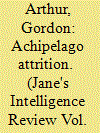

|
|
|
|
|
| Publication |
2009.
|
| Summary/Abstract |
The Islamist insurgent group, the Abu Sayyaf Group, has proven its ability to inflict significant losses on the Philippine military in recent attacks. Gorden Arthur examines the army's operations aimed at dismantling the rebel group and undermining its civilian support.
|
|
|
|
|
|
|
|
|
|
|
|
|
|
|
|
| 2 |
ID:
182544
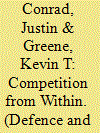

|
|
|
|
|
| Summary/Abstract |
Why do militant groups turn on each other? This behavior is somewhat puzzling, since such groups are often on the same side of a conflict. A growing body of literature seeks to understand political violence by looking at cooperative and competitive relationships among non-state actors. Debates continue about the sources of militant group rivalry. We argue that shared motivations, especially ethnic motivations, along with power differences among groups should help explain inter-group fighting. Our analysis uses new dyadic data on rivalry among the militant groups of Africa and Asia since 1990. Unlike some previous studies, we analyze both terrorist and insurgent organizations. Results suggest that pairs of groups with a shared ethnic identity are more likely than others to have rivalrous relationships. Power asymmetry is also somewhat associated with rivalry, but interaction models indicate that the association is only statistically significant in the presence of shared ethnic motivations.
|
|
|
|
|
|
|
|
|
|
|
|
|
|
|
|
| 3 |
ID:
144618
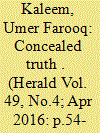

|
|
|
| 4 |
ID:
139122
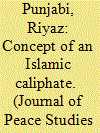

|
|
|
| 5 |
ID:
131470
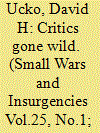

|
|
|
|
|
| Publication |
2014.
|
| Summary/Abstract |
The Western interventions in Iraq and Afghanistan have produced a heated polemic concerning the merits and demerits of counterinsurgency - the operational approach underpinning both campaigns. The two books reviewed here provide a good summation of the arguments against counterinsurgency: it is not a strategy and will fail when mistaken as such; its theory does not make intervention and war significantly easier; and even the most successful counterinsurgency campaigns have been bloody, violent, and protracted. Yet as this review highlights, beyond these central points, criticism of counterinsurgency is too often off the mark in its approach and totalizing in its pretentions. There is much to criticize and an urgent need to learn from past campaigns, yet bold claims and broad generalizations can mislead rather than enlighten. The analysis is particularly unhelpful when the definition of the central issue at hand - counterinsurgency - is being unwittingly or deliberately distorted. In the end, these two books form a poor basis for the debate that must now take place, because they are too ideological in tone, too undisciplined in approach, and therefore too unqualified in what they finally say.
|
|
|
|
|
|
|
|
|
|
|
|
|
|
|
|
| 6 |
ID:
149652
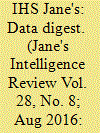

|
|
|
|
|
| Summary/Abstract |
IHS Jane''s terrorism and insurgency centre presents its global attack index, a monthly summary of worldwide attacks by non-state armed groups collected from open sources.
|
|
|
|
|
|
|
|
|
|
|
|
|
|
|
|
| 7 |
ID:
133712
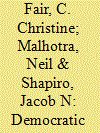

|
|
|
|
|
| Publication |
2014.
|
| Summary/Abstract |
A long-standing research tradition on political culture argues that greater support for core liberal values leads to a rejection of destructive political activities and reduced support for violent politics. In this vein, many contemporary analysts of security policy contend that a lack of democratic values in the Middle East promotes the development of violent political organizations. Unfortunately, there have been few direct tests of the hypothesis that an individual's rejection of democratic values correlates with support for militant groups. We conduct such a test in Pakistan using an original 6,000-person provincially representative survey. We find that strong supporters of democratic values are actually more supportive of militant groups and that this relationship is strongest among those who believe that Muslim rights and sovereignty are being violated in Kashmir. This is consistent with the context of Pakistani politics, where many militant groups use the principle of azadi (i.e., freedom and self-determination) to justify their actions. These results challenge the conventional wisdom about the roots of militancy and underscore the importance of understanding how local context mediates the influence of civic culture on political stability and violence.
|
|
|
|
|
|
|
|
|
|
|
|
|
|
|
|
| 8 |
ID:
173812
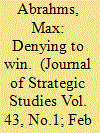

|
|
|
|
|
| Summary/Abstract |
Terrorism carries high audience costs for militant leaders because the attacks on civilians risk tarnishing the entire group as immoral extremists. Image-savvy militant leaders reduce the reputational fallout to the group whenever members commit terrorism. Specifically, the leaders distance their organization from civilian attacks by denying them. In this paper, I identify two types of denial strategies regularly employed by militant leaders, their effectiveness for image restoration, and how Islamic State paid a price for failing to employ them.
|
|
|
|
|
|
|
|
|
|
|
|
|
|
|
|
| 9 |
ID:
104496
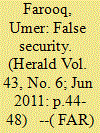

|
|
|
| 10 |
ID:
129628
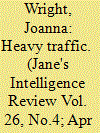

|
|
|
| 11 |
ID:
089751
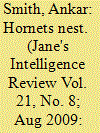

|
|
|
|
|
| Publication |
2009.
|
| Summary/Abstract |
Harbouring both criminal and militant groups, Camp 5 is a powerful enclave. When two vessels carrying valuable cargo were attacked in May, the government launched a military crackdown on the camp and offered an amnesty to militants. Article assesses the impact.
|
|
|
|
|
|
|
|
|
|
|
|
|
|
|
|
| 12 |
ID:
131340
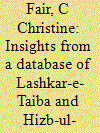

|
|
|
|
|
| Publication |
2014.
|
| Summary/Abstract |
This article uses a novel database of 1,625 posthumously published biographies of members of two Islamist militant organizations (Lashkar-e-Taiba (LeT) and Hizb-ul-Mujahideen (HM)), all of whom were killed in the course of carrying out militant attacks. In general, each biography provides data on the militant's birthplace, education, recruitment, and training. The number of observations in this database is a full order of magnitude larger than those of previous databases assembled from militant biographies. While the sample of militants in this database is the product of multiple selection effects, analysis of the database undermines many common myths about Pakistani militants and casts doubt on current policy approaches to mitigating Islamist militancy in Pakistan.
|
|
|
|
|
|
|
|
|
|
|
|
|
|
|
|
| 13 |
ID:
156905


|
|
|
|
|
| Summary/Abstract |
Targeted killings have become a central component of counterterrorism strategy. In response to the unprecedented prevalence of this strategy around the world, numerous empirical studies have recently examined whether “decapitating” militant groups with targeted killings is strategically effective. This study builds on that research program by examining the impact of targeted killings on militant group tactical decision-making. Our empirical strategy exploits variation in the attack patterns of militant groups conditional on whether a government’s targeted killing attempt succeeded against them operationally. In both the Afghanistan-Pakistan and Israel-West Bank-Gaza Strip theaters, targeted killings significantly alter the nature of militant group violence. When their leaderships are degraded with a successful strike, militant groups become far less discriminate in their target selection by redirecting their violence from military to civilian targets. We then analyze several potential causal mechanisms to account for these results and find strongest evidence that targeted killings tend to promote indiscriminate organizational violence by empowering lower level members with weaker civilian restraint.
|
|
|
|
|
|
|
|
|
|
|
|
|
|
|
|
| 14 |
ID:
132826
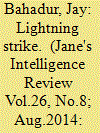

|
|
|
|
|
| Publication |
2014.
|
| Summary/Abstract |
A suicide attack at a restaurant in Djibouti showed Harakat-Al-Shabaab Al-Mujahideen's continued ability to launch cross border militant attacks. Jay Bahadur consider whether Ethiopia will be the Islamist extremist group's next target.
|
|
|
|
|
|
|
|
|
|
|
|
|
|
|
|
| 15 |
ID:
124985
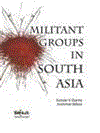

|
|
|
|
|
| Publication |
New Delhi, Pentagon Press, 2014.
|
| Description |
xvi, 302p.Hbk
|
| Standard Number |
9788182747548
|
|
|
|
|
|
|
|
|
|
|
|
Copies: C:2/I:0,R:0,Q:0
Circulation
| Accession# | Call# | Current Location | Status | Policy | Location |
| 057477 | 364.10660954/SHA 057477 | Main | On Shelf | General | |
| 057478 | 364.10660954/SHA 057478 | Main | On Shelf | General | |
|
|
|
|
| 16 |
ID:
149690
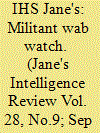

|
|
|
|
|
| Summary/Abstract |
IHS Jane's examines significant online activity by militant groups during July-August, as activities and supporters reacted to international events. Excerpts are sourced from a range of social media platforms and analysed for their implications.
|
|
|
|
|
|
|
|
|
|
|
|
|
|
|
|
| 17 |
ID:
156015
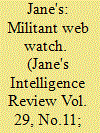

|
|
|
| 18 |
ID:
157429
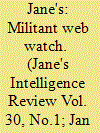

|
|
|
| 19 |
ID:
157440
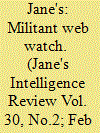

|
|
|
| 20 |
ID:
128096
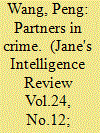

|
|
|
|
|
| Publication |
2012.
|
| Summary/Abstract |
Triads from Hong Kong and Taiwan have moved some of their operations to mainland China to take advantage of its booming economy and less stringent policing. Peng Wang examines the security challenge of the groups mainlandisation.
|
|
|
|
|
|
|
|
|
|
|
|
|
|
|
|